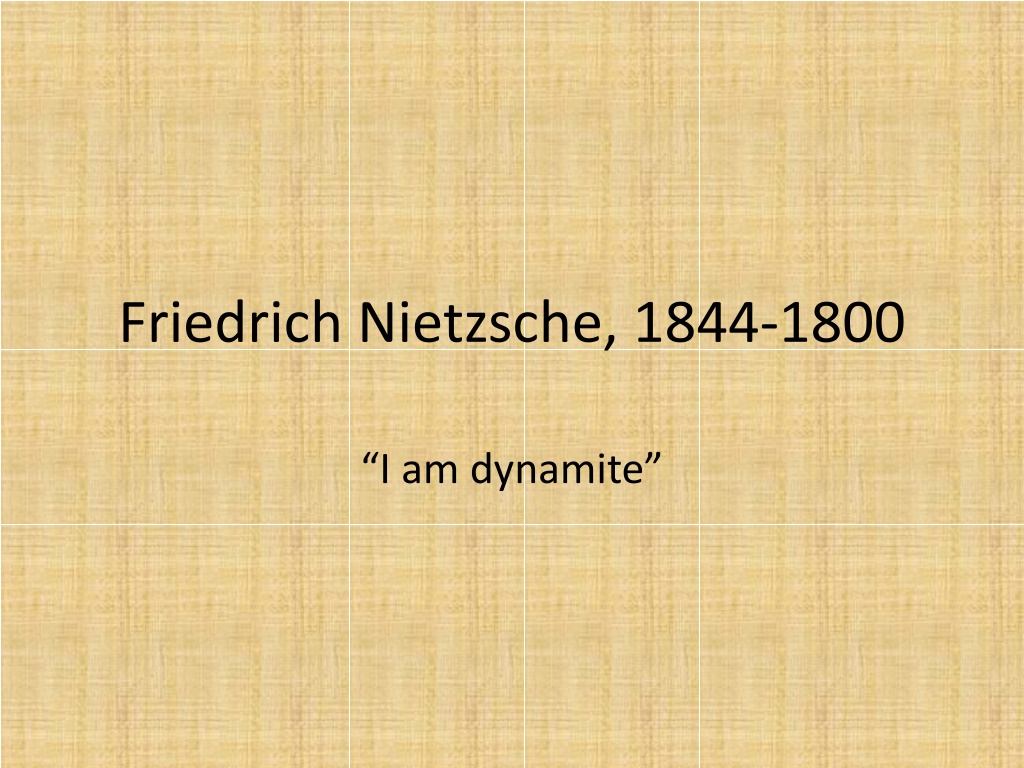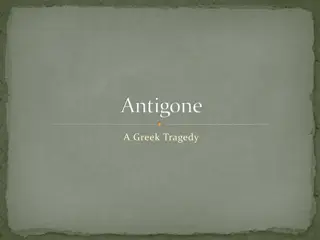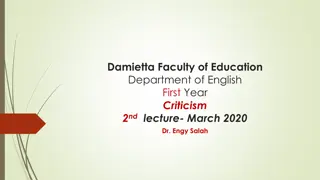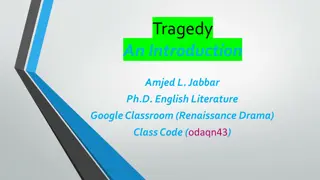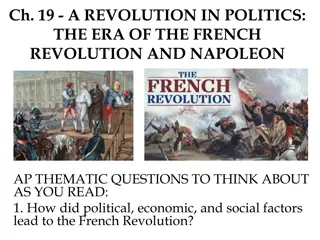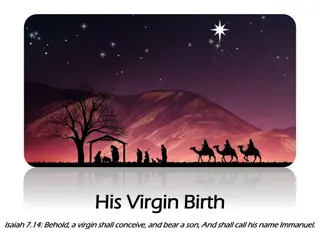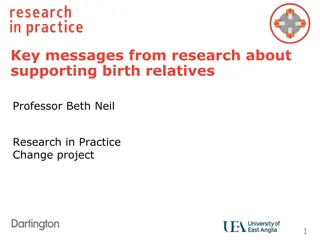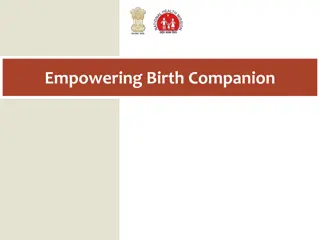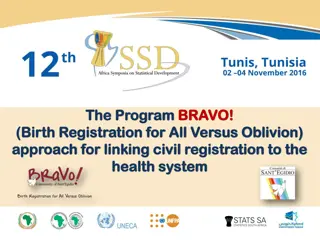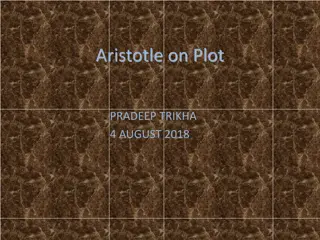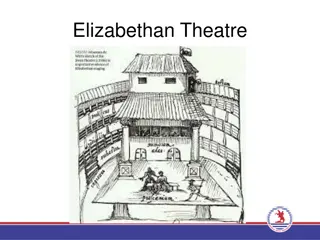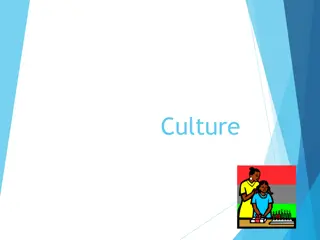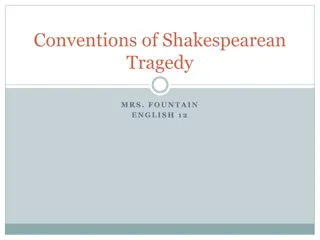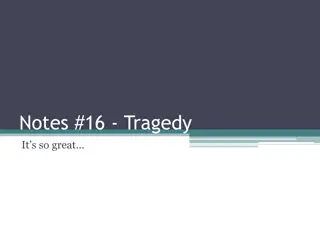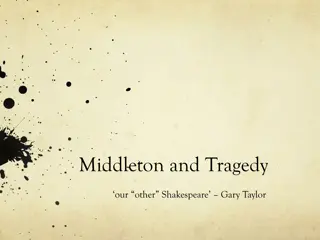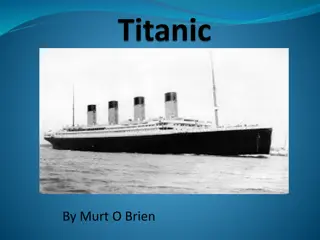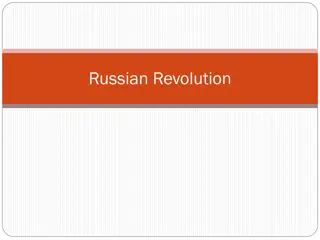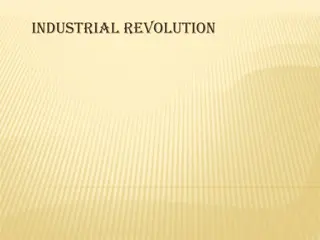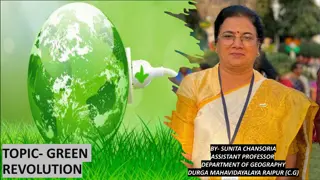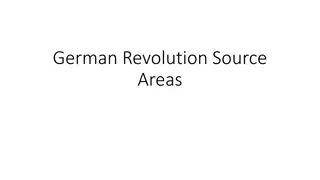Insights into Cultural Revolution and the Birth of Tragedy
Explore the concept of cultural revolution and the performative acts that bring about significant historical changes, as exemplified through Louis XVI's summoning of the Estates General in 1789. Delve into Nietzsche's philosophical musings on human nature, inheritance, and the perpetual struggle to transcend one's origins through conscious self-transformation.
Download Presentation

Please find below an Image/Link to download the presentation.
The content on the website is provided AS IS for your information and personal use only. It may not be sold, licensed, or shared on other websites without obtaining consent from the author. Download presentation by click this link. If you encounter any issues during the download, it is possible that the publisher has removed the file from their server.
E N D
Presentation Transcript
Friedrich Nietzsche, 1844-1800 I am dynamite
Wagner The Tristan Chord http://www.youtube.com/watch?v=fktwPGC R7Yw
Early Project: Cultural Revolution For since we are the outcome of earlier generations, we are also the outcome of their aberrations, passions and errors, and indeed of their crimes; it is not possible to free oneself wholly from this chain. If we condemn these aberrations, and regard ourselves free of them, this does not alter the fact that we originate in them. The best we can do is to confront our inherited and hereditary nature with our knowledge of it, and through a new, stern discipline combat our inborn heritage and implant in ourselves a new habit, a new instinct, a second nature, so that our first nature withers away. It is an attempt to give oneself, as it were a posteriori, a past in which one would like to originate in opposition to that in which one did originate: always a dangerous attempt because it is so hard to know the limit to denial of the past and because second natures are usually weaker than first. What happens all too often is that we know the good but do not do it, because we also know the better but cannot do it. But here and there a victory is nonetheless achieved, and for the combatants, for those who employ critical history for the sake of life, there is even a noteworthy consolation: that of knowing that this first nature was once a second nature and every victorious second nature will become a first. -- On the Use and Misuse of History of Life (3)
How do We Bring Something into Existence? The Performative In 1789 Louis XVI of France found himself compelled to call the Estates General into session. The Estates General were composed of the nobility, the clergy, and the Third Estate, which stood for the non-privileged classes; they had not been summoned since 1614 when the meeting dissolved without agreement after the Third Estate refused to consent to the abolition of the sale of offices unless the nobility gave up some of their privileges. The convocation of the Estates was thus essentially a medieval practice, hardly an institution. On June 17, 1789, the Third Estate declared itself to be the National Assembly of France. The question immediately raised is to the authority by which, in terms of which, this claim has legitimacy. The assembled delegates (they are even really delegates in that they are not for the most part elected) cannot be calling upon an existing authority they are trying to call one into existence to create a past so as to give themselves a reality in the present. The King, it should be noted, had the Assembly building surrounded by troops and ordered them to disperse, stating that their naming of themselves the National Assembly meant nothing and was therefore null and void.
The birth of Tragedy A public of spectators as we know it was unknown to the Greeks: in their theaters the terraced structure of the concentric arcs of the spectator-place made it possible for everyone actually to overlook ( bersehen) the whole world of culture around him and to imagine, in absorbed concentration, that he himself was a chorist. The Dionysian excitement is capable of communicating this artistic gift to a multitude, that of seeing themselves surrounded by such a host of spirits, knowing that one is inwardly one with them. This process of the tragic chorus is the dramatic protophenomenon: to see oneself [as on stage] transformed before oneself [as seating as audience] and now to behave as if one had actually entered into another body, into another character. This process stands at the beginning of the development of the drama. (8)
Become Who You Are!* cf Mill, Marx, Rousseau Living and experiencing When we observe how some people know how to manage their experiences their insignificant, everyday experiences so that they become an arable soil that bears fruit three times a year, while others and how many there are! -- are driven through surging waves of destiny, the most multifarious currents of the times and the nations, and yet always remain on top, bobbing like a cork: then we are at the end tempted to divide mankind into a minority (a minimality) of those who know how to make much of little, and a majority of those who know how to make little of much; indeed, one does encounter those inverted sorcerers who, instead of creating the world out of nothing, create nothingness (das Nichts) out of the world. -- Human, All-Too-Human 627 *cf Pindar, Second Pythian Ode
Taking Nietzsche Seriously: The philosophical and political import of rhetoric
Why so many readings? 1. internally inconsistent 2. evolution (three stages theory) 3. analytically confused
David Allison Reading the New Nietzsche Nietzsche writes exclusively for you. Not at you but for you. For you, the reader. Only you.
The Doctrine of Style, 1882 1. Das Erste, was noth thut, ist Leben: der Stil soll leben. 1. The first necessary matter is life: Style must live. 2. Der Stil soll dir angemessen sein in Hinsicht auf eine ganz bestimmte Person, der du dich mittheilen willst. (Gesetz der doppelten Relation.) 2. Style must in retrospect be appropriate for you in relation to the whole particular person with whom you wish to confide. (The law of the double relation). 3. Man mu erst genau wissen: so und so w rde ich dies sprechen und vortragen bevor man schreiben darf. Schreiben mu eine Nachahmung sein. 3. One must first be quite clear about this: thus and thus do I wish to speak and express myself before one has the right to write. Writing must be an emulation (Nachahmung) 4. Because many of the means of those who speak (Vortragenden) are missing to those who write, the person who writes must have an overall highly developed expressive ability to present discourse as a model: the presentation of that which is written must necessarily fall out as much paler. 4. Weil dem Schreibenden viele Mittel des Vortragenden fehlen, so mu er im Allgemeinen eine sehr ausdrucksvolle Art von Vortrage zum Vorbild haben: das Abbild davon, das Geschriebene, wird schon nothwendig viel bl sser ausfallen 5. Der Reichthum an Leben verr th sich durch Reichthum an Geb rden. Man mu Alles, L nge und K rze der S tze, die Interpunktionen, die Wahl der Worte, die Pausen, die Reihenfolge der Argumente als Geb rden empfinden lernen. 5. Wealth in life betrays itself as wealth in gestures (Geb rde). Everything, the length and brevity of sentences, punctuation, the choice of words, pauses, the sequence of arguments must be learned to be understood as gestures. 6. Vorsicht vor der Periode! Zur Periode haben nur die Menschen ein Recht, die einen langen Athem auch im Sprechen haben. Bei den Meisten ist die Periode eine Affektation. 6. Be careful about the use of periods (full stops). Only those beings that have a lengthy breath in speaking have the right to periods. For most, the use of periods is an affection. 7. Style should show (beweisen) that one believes in ones thoughts, and does not only think them, but rather feels them. 7. Der Stil soll beweisen, da man an seine Gedanken glaubt, und sie nicht nur denkt, sondern empfindet. 8. The more abstract is the trust that one wishes to teach, the more must one bring (verf hren) sense (Sinne) to it. 8. Je abstrakter die Wahrheit ist, die man lehren will, um so mehr mu man erst die Sinne zu ihr verf hren. 9. In the choice of its means, the rhythm of a good writer of prose (Prosaiker) approaches that of poetry, however without ever surpassing it. 9. Der Takt des guten Prosaikers in der Wahl seiner Mittel besteht darin, dicht an die Poesie heranzutreten, aber niemals zu ihr berzutreten. 10. It is neither proper nor intelligent to anticipate the small objections (leichteren Einw nde) for ones readers. It is very proper and very intelligent to leave it to ones readers to express themselves the essential point of our wisdom. 10. Es ist nicht artig und klug, seinem Leser die leichteren Einw nde vorwegzunehmen. Es ist sehr artig und sehr klug, seinem Leser zu berlassen, die letzte Quintessenz unsrer Weisheit selber auszusprechen.
The reader who falls short of the aphorism s resonant or entire meaning, i.e. the reader who misses its musical significance, not only fails to get it, as we say, but this failure is ineluctable because it is a failure unawares, hence, and effectively, incorrigible. Any aphorism, every Nietzschean text, has at least two points, if not indeed many more, which excess permits most readers to come away with at least a partial notion of the text.... Taking up the musical sense of the aphorism, one keeps both its subject matter and its development as part of a whole. Thus positions, statements at variance with one another are not simple contradictions but contrapuntal... from Babette E. Babich, Music in Plato, Nietzsche, Heidegger in Robert Burch and Massimo Verdicchio, eds., Gesture and Word: Thinking Between Philosophy and Poetry. London: Continuum, 2002. p. 178. Expanded in her Words in Blood, Like Flowers. : The Philosophical Praxis of
GM I, 1 Diese englischen Psychologen, denen man bisher auch die einzigen Versuche zu danken hat, es zu einer Entstehungsgeschichte der Moral zu bringen, sie geben uns mit sich selbst kein kleines R thsel auf; sie haben sogar, dass ich es gestehe, eben damit, als leibhaftige R thsel, etwas Wesentliches vor ihren B chern voraus sie selbst sind interessant! These English psychologists, whom one has also to thanks for the only attempts hitherto to arrive at a history of the origin of morality they themselves are no easy riddle; I confess that, as living riddles, they even possess one essential advantage over their books they are interesting! [Kaufmann] These English psychologists, who have to be thanked for having made the only attempts so far to write a history of the emergence of morality, -- provide us with a small riddle in the form of themselves; in fact, I admit that as living riddles they have a significant advantage over their books they are actually interesting! [Diethe] These English psychologists, whom one has to thank for having brought into the world the up until now only attempt at an account of the emergence of morality, -- by their person they assign to us no small riddle; I confess that even as living riddles they have an essential advantage over their books they themselves are interesting! [mine]
GM I, 7 -- You will have already guessed how easily the priestly way of evaluating can split from the knightly-aristocratic and then continue to develop into its opposite. Such a development receives a special stimulus every time the priestly caste and the warrior caste confront each other jealously and cannot be one with the other as to the prize. The premise of the knightly-aristocratic value-judgments is a powerful physicality, a radiant [bl hende: Diethe gives blossoming, Kaufmann flourishing], rich, a health that overflows itself [ selbst bersch umende: D: even effervescent; K even overflowing], which includes all that it needs to maintain itself, war, adventure, the hunt, the dance, sports *(Kampfspiele: D jousting, K war games) and above all contains in itself all that is strong, free, happy activity. "Deutsche Kampfspiele" ("German Fighting/Battle Games") was the name given to the games in Germany in 1920, 1922 (WInter), 1926 and 1930 when Germany was excluded from the Olympics.
Twilight of the Idols: Morality as Anti- Nature, section 5 Given that one has grasped the sacrilege of such a revolt against life, like the revolt that has become nearly sacrosanct in Christian morality, one thus has, fortunately, grasped something else as well: the uselessness, illusiveness, absurdity, and mendacity of such a revolt.
Twilight of the Idols: Morality as Anti-Nature, 5 A condemnation of life by one who is alive remains, in the end, just a symptom of a particular kind of life: this does not at all raise the question of whether the condemnation is justified or unjustified.
One would have to occupy a position outside life, and on the other hand to know it as well as one, as many, as all who have lived it, in order to be allowed even to touch upon the problem of the value of life:
these are the reasons enough to grasp that, for us, this problem is an inaccessible problem. When we speak of values, we speak under the inspiration , under the optics of life: life itself is forcing us to posit values, life itself is valuing by means of us, if [and/or when: wenn] we posit values...
It follows from this that even that anti- natural morality that takes God to be the antithesis and condemnation of life is only one of life s value judgments. -- a judgment made by which life? Which kind of life?
-- I already gave the answer: declining, weakened, tired, and condemned life.
Ecce Homo, What I Write Such Good Books Ultimately, nobody can get more out of things, including books, than he already knows. For what one lacks access to from experience one will have no ear. Now let us imagine an extreme case: that a book speaks of nothing but events that lie altogether beyond the possibility of any frequent or even rare experience that it is a first language for a new series of experiences. This is in the end my average experience and, if you will, the originality of my experience. Whoever thought he had understood something of me, had made up something out of me, after his own image
